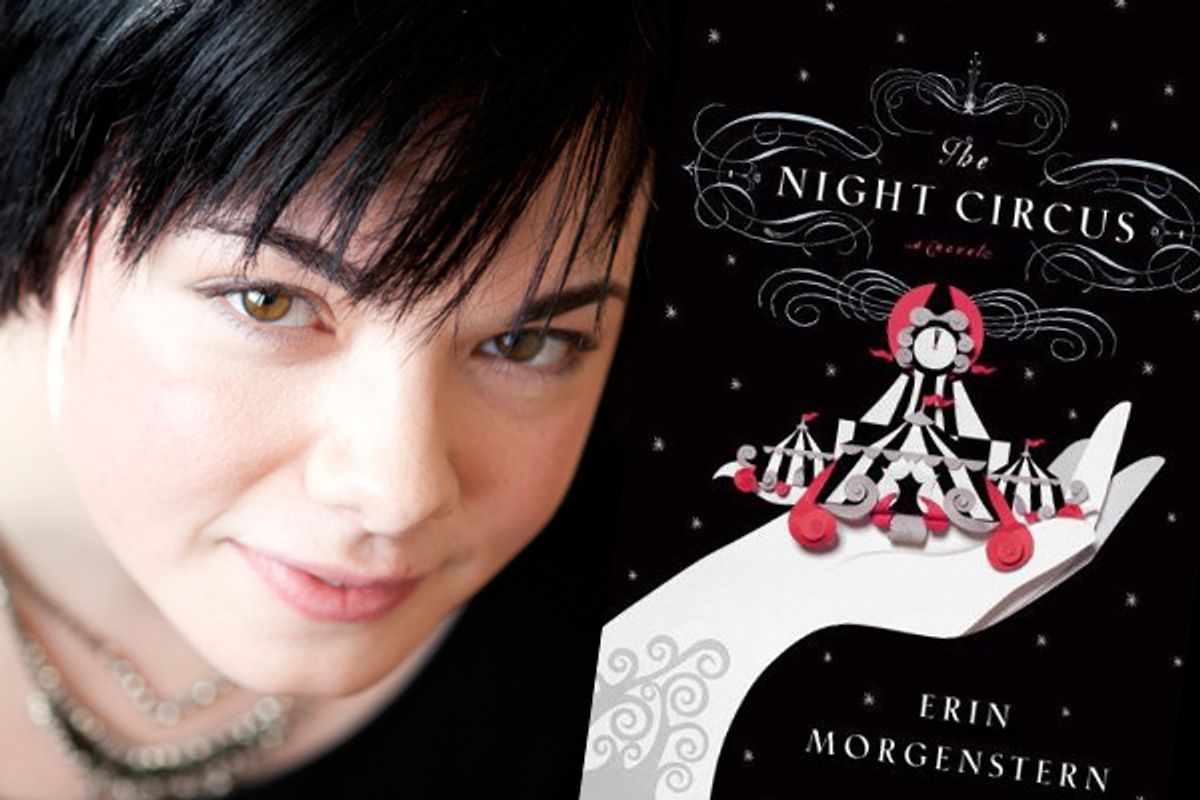"The Night Circus" by Erin Morgenstern is the book every Neil Gaiman-loving girl with creatively dyed hair and authorial aspirations dreams of writing. A confection of heady imagery and dulcet prose, it appears this month in a hardcover edition as sumptuous as the circus it's named after, flaunting all the dazzle that can still be carried off by good ol' black-and-white (and good ol' print) when someone decides to pull out all the stops.
The novel is the story of a two young magicians raised from childhood to compete in an elaborate contest, the rules of which are not fully explained to them until late in the game. The titular circus -- open only between nightfall and dawn, and decked out in a strictly nonchromatic color scheme -- is the traveling venue where, unbeknown to the public, they demonstrate their skills. Less a big-top-style show than the ultimate arty fun house, the circus consists of a network of many large and small tents, some containing conventional entertainments like acrobats and fortunetellers, others featuring such improbable marvels as a menagerie of life-size paper animals; a garden made entirely of ice, right down to each individual blade of grass; and a carousel that goes not in circles but "through loops of silver clockwork and tunnels."
This dueling-sorcerers premise brings to mind Susanna Clarke's magnificent 2004 novel, "Jonathan Strange & Mr. Norrell." Both books are set in the 1800s, but while Clarke's was saturated in its period, "The Night Circus" is extravagantly anachronistic. Morgenstern's late Victorian London is not a historical setting at all, but the occasion for an aesthetic fantasia with all the trimmings, giving her characters cause to dress up in corseted gowns and ride around in lavishly appointed private railway cars. (Their behavior and manners are otherwise those of contemporary Americans.)
Morgenstern's magicians, male and female, rather predictably fall in love. The fate of Marcus and Celia's star-crossed romance provides "The Night Circus" with its story, which is sentimental enough to win over a large audience but unlikely to cloy the palates of more sophisticated readers. Plot is this novel's flimsiest aspect, however, serving mostly as a pretext for presenting readers with a groaning board of imaginative treats. Morgenstern's antagonists are not especially menacing and her efforts to indicate that something terrible might possibly happen are never more than halfhearted.
While weaknesses like these might have scuttled a different sort of novel, they end up becoming part of the charm of "The Night Circus." Morgenstern has called the book a "fairy tale" -- evoking a form that has never required psychologically complex characters or original plotlines -- and, true to that label, she employs her supple prose to conjure up a series of wonders: a maze made of clouds, a ship of books floating on a sea of ink, a tent that seems to contain a vast desert. "The Night Circus" is that rare combination of the theatrical and (with the unfortunate exception of an affected present-tense narration) the sincere. Perfection would have smothered its heart, which resides less in any individual character than in the author's yearning for the phantasmagorical.
Exercises in style (whether literary or visual -- and this book is a bit of both) can, when too accomplished, easily harden into a shellacked baroque. The touches of gawkiness and amateurism in "The Night Circus" humanize it, like the fingerprints of a potter left behind in the clay. They make it more craft than art, but then again, a more artful version would have had a lot less life in it. As it is, "The Night Circus" embodies a certain endearing early-21st-century DIY sensibility that's equal parts Victoriana, YA fantasy, handmade diorama, romance fiction and domesticated gothic. Think of it as the first Etsy novel. It's sweet and cozy but also intelligent and unconventional, and it makes for excellent company in a troubled time.



Shares